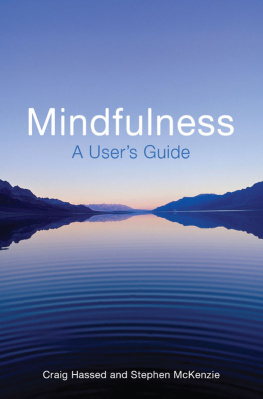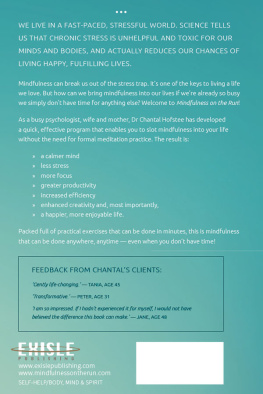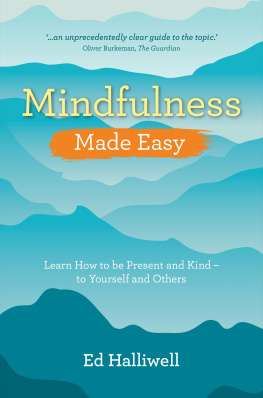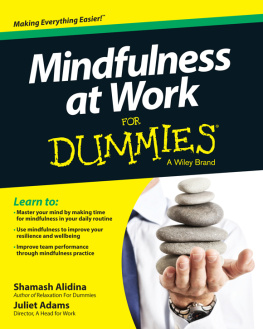Mirabai Bush - Working with Mindfulness: Research and Practice of Mindful Techniques in Organizations
Here you can read online Mirabai Bush - Working with Mindfulness: Research and Practice of Mindful Techniques in Organizations full text of the book (entire story) in english for free. Download pdf and epub, get meaning, cover and reviews about this ebook. year: 2013, publisher: More Than Sound, genre: Religion. Description of the work, (preface) as well as reviews are available. Best literature library LitArk.com created for fans of good reading and offers a wide selection of genres:
Romance novel
Science fiction
Adventure
Detective
Science
History
Home and family
Prose
Art
Politics
Computer
Non-fiction
Religion
Business
Children
Humor
Choose a favorite category and find really read worthwhile books. Enjoy immersion in the world of imagination, feel the emotions of the characters or learn something new for yourself, make an fascinating discovery.

- Book:Working with Mindfulness: Research and Practice of Mindful Techniques in Organizations
- Author:
- Publisher:More Than Sound
- Genre:
- Year:2013
- Rating:3 / 5
- Favourites:Add to favourites
- Your mark:
Working with Mindfulness: Research and Practice of Mindful Techniques in Organizations: summary, description and annotation
We offer to read an annotation, description, summary or preface (depends on what the author of the book "Working with Mindfulness: Research and Practice of Mindful Techniques in Organizations" wrote himself). If you haven't found the necessary information about the book — write in the comments, we will try to find it.
Conversations with Mirabai Bush, co-founder of The Center for Contemplative Mind in Society, and key adviser to Googles Search Inside Yourself curriculum about the various applications of mindfulness research and practice to workplace environments. Featuring Jeremy Hunter, Daniel Goleman, Richard Davidson, and George Kohlrieser. Available as ebooks from all major retailers.Titles include:Mindfulness for Executives with Jeremy Hunter, PhD, Assistant Professor of Practice at The Peter F. Drucker School of Management. Dr. Hunter created The Executive Mind, a series of executive education courses that seek to clarify and redefine how attention-training practices and cultivating quality of mind can enhance productivity and performance.Dr. Hunter shares his unique experience of offering mindfulness methods to executives, and highlights why mindfulness is the necessary and fundamental skill for todays knowledge worker environment. He explores questions like:- How are we stuck in an old framework of productivity that inhibits real innovation?- What about todays working environment makes mindfulness necessary?- What new vocabulary and methodology do we need to develop to meet our changing circumstances?- Is productivity what we should really care about anyway?Mindfulness and Stress Reduction with Daniel Goleman, best-selling author of Emotional Intelligence. Dr. Goleman discusses the stress-reducing qualities of mindfulness, how to develop emotional intelligence through mindfulness, and choosing the right natural stress-reduction technique to suit the practitioners preferences and situation.Chronic stress on the job leads to a myriad of health issues and high turnover, both of which negatively impact an organizations productivity. Our system isnt programmed to be in constant fight or flight mode. While we cant always immediately change our stressors, we still need to find regular periods of rest and relaxation to maintain our well-being. Finding the right relaxation technique can help you balance your nervous system, feel more relaxed and better cope with lifes stressful challenges.Neuroscience at Work with Richard Davidson, Director of the Waisman Laboratory for Brain Imaging and Behavior and the Laboratory for Affective Neuroscience at the University of Wisconsin-Madison.Dr. Davidson discusses his research on meditation as it relates to happiness, distraction, neuroplasticity and recovering from negative information, as well as key findings from his latest book The Emotional Life of Your Brain.Mindfulness and Conflict Resolution with George Kohlrieser, Professor of High-Performance Leadership at IMD and veteran hostage negotiator. Professor Kohlrieser focuses on his experience applying mindfulness methods to promote calmness and compassion during negotiations and difficult conversations.We know that when the brain is calm you listen better. Mindfulness can create a foundation for emotional bonding that allows you to be fully present and authentic during dialogues or a discussion. A mindful approach to entering difficult conversations keeps both parties out of the heat of emotions and able to explore the needs, wants and interests on both sides. Judgement is suspended and, with a strong bond, the mind is able to focus on and look for the mutual benefit of the common goal.
Mirabai Bush: author's other books
Who wrote Working with Mindfulness: Research and Practice of Mindful Techniques in Organizations? Find out the surname, the name of the author of the book and a list of all author's works by series.









